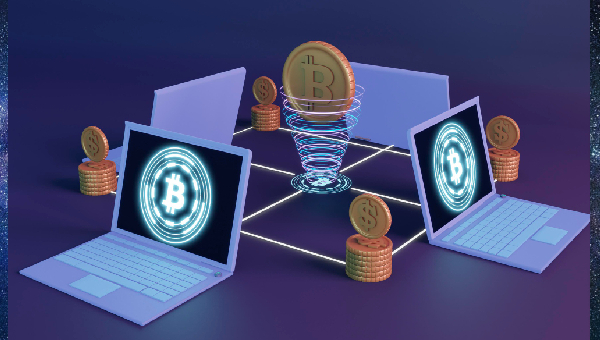How Blockchain Is Changing More Than Just Cryptocurrencies

Blockchain linked only with virtual money as Bitcoin and Ethereum is a much wider concept with great potential in the world. Although its introduction using cryptocurrencies has created controversy and doubt, it is the fundamental tendencies of the blockchain, including decentralization, transparency, and security, that are opening new opportunities in finance, healthcare, SCM and even voting. This article explains why blockchain is not only changing the future of money but many industries as well.
Understanding Blockchain: Beyond the Basics
- At its most basic, a blockchain is an open ledger that is brought into various decentralized configurations to log transactions. This method is that unlike the more conventional systems—for example, those involving a bank or a government—that authorize and monitor the transactions, the blockchain coordinatively employs several computers (or nodes) to determine whether each transaction is valid. These transactions are assembled or merged in a block and connected in chronological order and are therefore referred to as blockchain.
- Each block includes four parts: the hash of the last block, the real data of the trades, the time, and all this makes the system very hard to change. Changing the data of any block would demand that its hash be changed, and that is done for the following blocks, which is extremely time-consuming and why it makes blockchain safe. These features have enabled cryptocurrencies; however, the same attributes can be used across sectors in diverse ways that have not yet been fully realized.
Blockchain in Supply Chain Management
- The concept of global supply chain management covers player’s rights from the supply of materials to manufacturing, and distribution of end products to consumers, and there must always be harmony. A major area of concern usually noted in supply chain management is the ability to ensure visibility from the raw material to the final consumer. Historically supply chain management has utilized centralized systems which are more prone to mistakes, fraud, and delay.
- To overcome the above-mentioned challenges, blockchain solution offers the Advantage of an incorruptible ledger that records all details of the supply chain transactions. For instance, the journey of a product from a farm up to a supermarket can be embodied on the blockchain, starting from receiving the product, its confirmation for it acting in the buyer’s best interest and ensuring that it complies with all the set regulations concerning the product safety as well as quality. At the moment, organizations like IBM and Walmart are applying blockchain to solve issues with food safety. Concerning contamination or recall, through the application of blockchain, tracking of the journey of a particular product can be done in real-time and this in turn saves time. This technology is effective in industries including agriculture, pharmaceuticals, and luxury products, where customers demand transparency.
Blockchain in Healthcare
- The healthcare niche is another area that the blockchain focuses on after getting out of the gate. Care of health information is not easy and there are many stakeholders such as patients, physicians, healthcare facilities, insurance companies, and the state. Some of these entities are independent working entities leading to fragmented data, reduced efficiency and high susceptibility to data theft.
- These problems can be addressed using the blockchain solution that allows for secure interoperability of ‘health information exchange’. In a blockchain system, the patients own their health records and thus can easily grant data access to healthcare research. Every time information in the patient’s electronic health record is revised, the respective transaction is completed on blockchain technology to guarantee the information recorded is accurate, updated, and cannot be altered.
- Besides, pharmaceuticals can also benefit from the implementation of blockchain by increasing the level of drug traceability necessary to prevent fake drug circulation. Through the use of supply chain technology, companies can monitor every phase of these drugs from their manufacturing right up to the final consumer to guarantee him/her genuine products. To such an extent, such tracking may help to reduce the circulation of falsified products in the market and improve the quality of patient lives.
Decentralized Finance & Its Subsector Smart Contracts
- While the root concept behind blockchain is cryptocurrencies, the growing paradigm of decentralized finance or DeFi is extending the adoption of the technology in the financial domain. DeFi is an abbreviation for decentralized finance which can be defined as all the transactions that occur in the financial world through blockchain technology, excluding stakeholders such as banks and brokers. Easily, this makes the provision of financial services decentralized thus providing a boost to the people in the region with little or no banking services.
- Smart contracts which are autonomous digital contracts with the terms of the venture being put down in code are among the leading developments in the DeFi space. These contracts provide for price and terms of delivery to be triggered automatically based on specific circumstances and no buyers and sellers are required. Such smart contracts are being used in situations such as lending, borrowing, use of insurance and derivative products. For instance in P2P lending models, the borrower together with the lender can fix the entire lending agreement onto a smart contract system. Any details about the interest rate, repayment fees and time limits are entered into the blockchain technology. It means that when the borrower repays the loan, the contract is signed, money is transferred to the lender and the whole process takes place excluding the bank.
Blockchain in Voting and Governance
- Election is important in a democratic constitution but is commonly associated with issues concerning security, integrity and vulnerability to fraud. In paper-based or other types of electronic voting systems, the entire credibility of a poll is undermined through manipulation, hacking or even mistakes. Making use of Blockchain technology is more secure compared to signing up for a vote in person.
- The cryptographic voting platform on the blockchain will enable the voters to vote at any alternative without the possibility of rigging. Every single one of them is stored on the Blockchain, it can therefore not be manipulated and deleted. This makes it possible for anyone to check the results as the elections are conducted thereby improving voter turnout.
- Some countries and even municipalities attempted to employ blockchain voting. For instance, during the 2018 mid-season in America’s West Virginia, the state employed the services of a blockchain-based voting system for military personnel who are sometimes deployed in various countries. According to the study, it was evident that blockchain delivered a secure, efficient, and convenient voting system.
Copyrights and Other Digital Rights
- The information and creative industry including the music and film industry and writing and publishing have always had issues of IP and DRM. Freelance artists, writers and content creators have problems in demonstrating ownership of their content, seeking legal protection for their copyright, and demanding adequate royalties for the utilization of their material.
- Blockchain provides an answer through a decentralized and unalterable registry of ownership. One can use blockchain and store artwork by artists on the platform and the mere act of storing creates an authenticity token. One of the applications of smart contracts is that royalty payments to artists can be programmed to occur any time their work is used or when their work is sold. This also minimizes institutionalization of profits and guarantees that inventors are paid their due, without biases from middlemen. For instance, the music industry can change as streaming services will have the possibility to use blockchain to count song plays and provide direct payments to performers. Sharing platforms like Audius are already utilizing blockchain to help musicians by providing them with full control of what they create.
Blockchain in Real Estate
- The real estate industry has long been plagued as one of the slow industries with great reliance on paperwork. Purchasing or selling real estate usually implies making use of several go-betweens, including agents, attorneys, and title firms, which further up the pace of transactions and requisition fees. The following steps can be facilitated by blockchain, as it will offer a proper, protected method of recording ownership as well as transfers of properties.
- By integrating blockchain, this paper emphasizes that property title deeds could be utilized as secured digital records that minimize fraudulence and ownership contestations. Smart contracts can also help with regards to transferring the title, which will in effect make the process of Real Estate much faster. For example, a buyer and a seller could have a smart contract that allows the exchange of cash and property or ownership once the conditions stipulated are met they do not require a formal closing. Organizations in certain countries such as Sweden and Georgia have begun using blockchain-based land registration systems, proving that this field can revitalize the real estate segment.
Conclusion
Blockchain technology has been quickly dismissed as nothing more than the underlying technology for cryptocurrencies. Meanwhile, utilization of its capability of decentralization, transparency, and security is expanding from industries including SCM, healthcare, finance, etc. With the future developments that are already in the pipeline, blockchain will revolutionize how business is transacted, data is handled or even how societies are regulated. As we are still experimenting with full-scale blockchain deployment, there’s much to come in terms of this innovative approach in the future.








